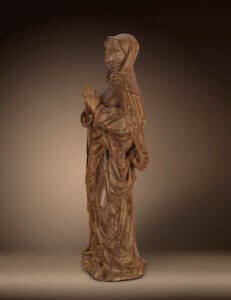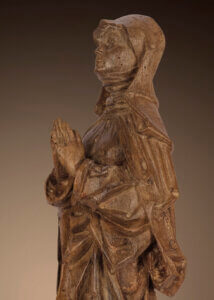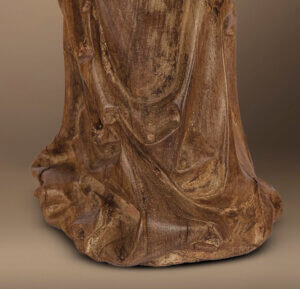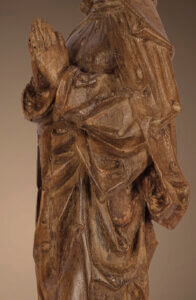Hildegard von Bingen (Bermersheim 1098 – 1179 Bingen) was a monastery founder, abbess and mystic. She was also a great natural scientist and naturopath who wrote down her knowledge of the active forces of nature in two works for which she is still famous today as the “first female physician to write”: Physica (Natural History) and Causae et curae (Causes and Treatment). The latter work was written around 1150-60 and deals, among other things, with creation and the associated connection between body and soul, with the cosmos, with treatises on healthy and sick people and with curative methods from traditional monastic medicine. The precise observation of natural phenomena is particularly significant; even women’s complaints are treated in astonishing detail and openness. Hildegard von Bingen always emphasized that she received her knowledge as divine visions and was commissioned to write them down.
The mystic is very rarely depicted in sculpture; the additional chronological placement in the late Gothic period makes this figure an even greater rarity. This extraordinary, full-round carved figure of the saint is particularly expressive due to her facial expressions and gestures. She is shown in an upright posture, her hands folded in front of her chest in a gesture of prayer. She is looking upwards, possibly in dialog with God. Her deep-set eyes are framed by short, sharp eyebrow ridges. The almond-shaped eyes are wide open. Her snub nose sits in the center of her face; her mouth is twisted into a slight smile. Her round face is framed by a typical velan over a scarf that covers her hair and neck. A tight-fitting coat is thrown over her shoulders and bunched up at her feet. The pleats on the sleeves, which are looped around her arms in ring-shaped formations, are particularly impressive. Bowl creases appear underneath. Voluminous, angular pleated panels alternate with close-fitting sections on the coat. Ear folds are shown at the bottom. The left side shows V-shaped, irregular bowl folds, while the right side shows tight folds in a kind of wet style. This gives the figure an interesting contrast in the surface structure, which guides the viewer’s eye over the garment. The back of the figure is simpler, indicating that the figure was designed for a display side.
Stylistically, the figure bears a strong resemblance to Daniel Mauch’s workshop works. As the last great artist of the Ulm School, Mauch is of particular importance. He opened his own workshop in 1503 and worked on numerous late Gothic altarpiece projects. His works already show echoes of the transition from the late Gothic to the Renaissance. The almost mischievously contorted mouth and the richly pleated robe with complicated folds show similarities to Mauch’s Anna Selbdritt from around 1510/15 from the Germanisches Nationalmuseum in Nuremberg (inv. no. Pl.O.199). The multi-part bowl folds around the neck also match numerous of his depictions of St. Anne in the Holy Kinship (including the Bavarian National Museum, Munich, inv. no. MA 1880; Parish Church of the Assumption of the Virgin Mary, Tomerdingen).
Literature:
Barbara Maier-Lörcher, Masterpieces of Ulm Art, Ostfildern 2004.
Brigitte Reinhardt (ed.), Michel Erhart & Jörg Syrlin the Elder: Late Gothic in Ulm, Ulm 2002.
Susanne Wagini, Der Ulmer Bildschnitzer Daniel Mauch (1477-1540), Forschungen zur Geschichte der Stadt Ulm (Volume 24), Ulm 1995.
The great book of Hildegard von Bingen. Proven healing knowledge for health and well-being, Cologne 2017.
LINKS:



